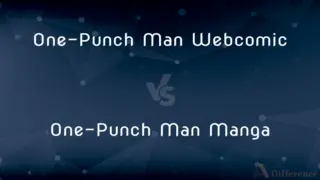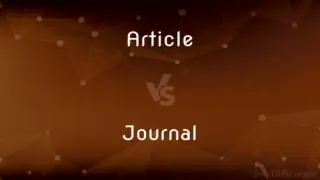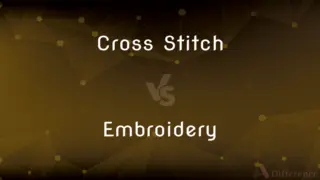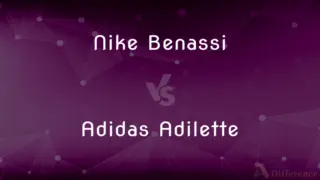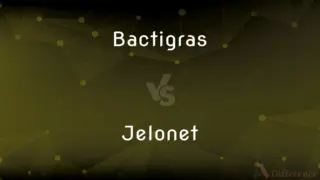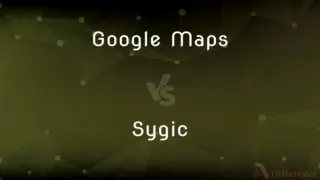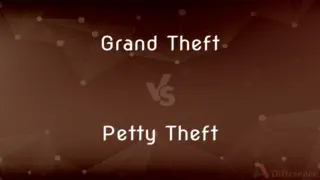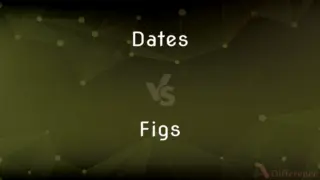Aun vs. Todavía — What's the Difference?
Edited by Tayyaba Rehman — By Fiza Rafique — Published on November 12, 2023
Aun means "even" in some contexts, and "still/yet" in others; Todavía primarily means "still" or "yet."

Difference Between Aun and Todavía
Table of Contents
ADVERTISEMENT
Key Differences
Aun and Todavía are Spanish words frequently used to express continuity or a state that remains the same. While both can mean "still" or "yet" in English, their application in sentences can vary. For instance, "aun" might convey an idea of "even if" or "even though," suggesting a condition or a surprising contrast. On the other hand, "todavía" generally emphasizes the ongoing nature of an action or state.
In many cases, Aun and Todavía can be used interchangeably when conveying the idea of "still" or "yet." For example, "Aun no he comido" and "Todavía no he comido" both mean "I haven't eaten yet." However, it's essential to note that "aun" often carries a nuance of "despite something" or "even."
A crucial distinction arises when "aun" is used without the accent mark versus "aún" with the accent. "Aun sin el dinero, querría ir" means "Even without the money, I would like to go." In contrast, "todavía" doesn't have such variations with accent marks and maintains its primary meaning.
In contexts where emphasis is on surprise or unexpected results, "aun" shines. For instance, "Aun con todos los problemas, logró terminar" translates to "Even with all the problems, he managed to finish." Conversely, "todavía" would be inappropriate here, as its primary emphasis is the continuation of a state or action.
Comparison Chart
Basic Meaning
Even / Still / Yet
Still / Yet
ADVERTISEMENT
Contextual Nuance
Can imply surprise or contrast
Emphasizes continuation
Accent Variation
"aun" vs. "aún"
No variation
Typical Usage
Conditions or unexpected results
Ongoing states or actions
Interchangeability
Sometimes, based on context
Often with "aún" for "still/yet"
Compare with Definitions
Aun
Even though
Aun cuando llovió, la fiesta fue un éxito.
Todavía
Up to this point
No he visto errores todavía.
Aun
Still/Yet (with accent "aún")
Aún no lo he encontrado.
Todavía
So far
Todavía hasta ahora, todo va bien.
Aun
Even
Aun los más pequeños pueden comprender.
Todavía
Yet
Todavía no he terminado la tarea.
Aun
Despite something
Aun con el frío, salió sin abrigo.
Todavía
Even now
Todavía después de tantos años, la recuerdo.
Aun
Expressing unexpected results
Aun sin estudiar, pasó el examen.
Todavía
Still
Todavía tengo hambre.
Common Curiosities
Is "todavía" used to express conditions?
No, "aun" is typically used in those contexts.
Does Todavía have an accent variation?
No, Todavía remains the same.
Can "aun" mean "even though"?
Yes, like in "Aun cuando llovió, la fiesta fue un éxito."
Can "todavía" mean "so far"?
Yes, it can, as in "Todavía hasta ahora, todo va bien."
Can "aun" express conditions?
Yes, it can suggest conditions or surprising contrasts.
Can "todavía" mean "even now"?
Yes, as in "Todavía después de tantos años, la recuerdo."
Is there an accent variation for Aun?
Yes, "aun" (even) vs. "aún" (still/yet).
Can Aun and Todavía be used interchangeably?
Sometimes, especially when meaning "still" or "yet," but context is key.
Can "todavía" express unexpected results?
Not typically. "Aun" is more suitable for that.
When would I use "aun" over "todavía" for surprise?
When expressing unexpected results or contrasts, like "Aun sin estudiar, pasó."
What's a common use of "todavía"?
Emphasizing the continuation of an action or state, like "Todavía tengo hambre."
How do you say "I haven't seen it yet" using both words?
"Aún no lo he visto" or "Todavía no lo he visto."
Is it common to mix up "aun" and "todavía"?
Yes, even native speakers occasionally interchange them, but context often clarifies meaning.
When might I use "aun" to express "even"?
In sentences like "Aun los más pequeños pueden comprender."
Does "aun" always need an accent?
No, the accent differentiates meanings: "aun" (even) vs. "aún" (still/yet).
Share Your Discovery

Previous Comparison
Lipstick vs. Lip Gloss
Next Comparison
Bitmap vs. PixmapAuthor Spotlight
Written by
Fiza RafiqueFiza Rafique is a skilled content writer at AskDifference.com, where she meticulously refines and enhances written pieces. Drawing from her vast editorial expertise, Fiza ensures clarity, accuracy, and precision in every article. Passionate about language, she continually seeks to elevate the quality of content for readers worldwide.
Edited by
Tayyaba RehmanTayyaba Rehman is a distinguished writer, currently serving as a primary contributor to askdifference.com. As a researcher in semantics and etymology, Tayyaba's passion for the complexity of languages and their distinctions has found a perfect home on the platform. Tayyaba delves into the intricacies of language, distinguishing between commonly confused words and phrases, thereby providing clarity for readers worldwide.














